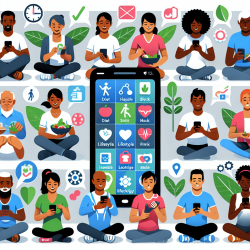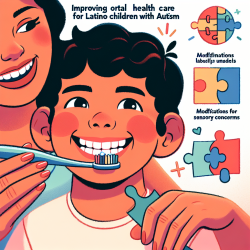Introduction
In the realm of speech-language pathology, particularly when working with children, the importance of evidence-based interventions cannot be overstated. While our primary focus is often on communication disorders, understanding the broader health landscape, including chronic conditions like Inflammatory Bowel Disease (IBD), can enhance our practice. A recent study titled "Identification and Evaluation of Mobile Applications for Self-Management of Diet and Lifestyle for Patients with Inflammatory Bowel Disease" offers valuable insights into the use of mobile health applications (mHealth apps) for managing IBD, which can be a valuable resource for practitioners aiming to broaden their scope of knowledge and improve patient outcomes.
Understanding the Study
The study evaluated mHealth apps available in the US and Canada, focusing on their quality, perceived impact on diet and mental health, and comprehensiveness in supporting self-management for IBD patients. The research identified 1,512 apps, of which only six met the inclusion criteria, emphasizing the limited availability of high-quality resources in this domain. Notably, the apps "My IBD Care: Crohn’s and Colitis" and "LyfeMD" emerged as top performers, offering behavior tracking and high-quality information.
Key Findings and Implications
For practitioners, understanding the potential of these apps can be transformative. The study highlights that while many apps exist, few effectively support the self-management of diet and lifestyle behaviors critical for IBD management. The top-rated apps not only provide tracking capabilities but also offer comprehensive programs addressing diet, physical activity, and mental health, which are crucial for improving quality of life and disease outcomes.
- My IBD Care: Crohn’s and Colitis received the highest quality rating, particularly excelling in mental health support.
- LyfeMD was noted for its comprehensive approach, offering tools for diet, physical activity, and mental health, making it a robust choice for holistic self-management.
Application in Practice
For speech-language pathologists, particularly those working in educational settings like TinyEYE, integrating knowledge of these apps can be beneficial. While our direct work may not involve managing IBD, understanding these tools can aid in holistic child development and support interdisciplinary collaboration. For instance, children with IBD may experience communication challenges related to stress or dietary restrictions. By recommending or integrating app-based interventions, practitioners can contribute to a more comprehensive care approach.
Encouraging Further Research
The study underscores the need for further research into the effectiveness of these apps in improving IBD outcomes. Practitioners are encouraged to stay informed about developments in mHealth technologies and consider participating in interdisciplinary research efforts. By doing so, we can contribute to a growing body of evidence that supports the integration of technology in health management, ultimately leading to better outcomes for children and adults alike.
To read the original research paper, please follow this link: Identification and Evaluation of Mobile Applications for Self-Management of Diet and Lifestyle for Patients with Inflammatory Bowel Disease.










